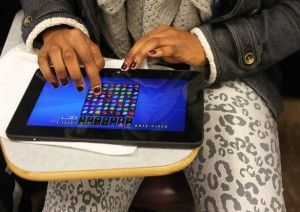New textbook platform facilitates education
January 28, 2013
Several courses have replaced textbook pages with webpages this semester.
Classes in fields such as university college and accounting are replacing textbooks with Dell tablets this semester. Amber Manning, University College 101 instructor, said tablets will be free for students during their entire course.
“I am nervous and excited about it,” she said. “This could be something that potentially will be bigger in the future when we switch to e-text.”
Advertisement
Karla Berry, Center for Teaching Excellence director, said the university plans to provide tablets for every incoming freshmen class starting fall 2013. The tablets contain instructional online material for whatever course the student with the tablet is taking.
“Ultimately, the goal is to provide innovative 21st century teaching and learning,” she said. “By providing every student with this device, we can plan content and instructional materials for that one device.”
A big reason for tablet use is to encourage e-textbooks, Berry said, which is also cheaper than a traditional textbook when provided to students in such mass quantities
“There are courses in different colleges, so we can see what works and what doesn’t work for next year,” Berry said. “We’re trying to work out the kinks now.”
Berry said the device is very important to the university’s core curriculum since the CTE plans to provide them for freshmen. A discussion concerning reduced-price tablet use for upperclassmen is ongoing, she said.
Wanli Zhao, assistant finance professor, said he is trying the tablets in his two classes, FIN 463-Forecasting and Capital Budget and FIN 469-Security Valuation.
Zhao said the tablets, which are pre-loaded with Windows 8 software, can also be used outside of class. Students can personalize the devices and download any available Internet application, he said, and the tablets allow potential for virtual meetings with students’ instructors and classmates after class hours.
Advertisement*
“This class I teach is heavy on case teaching, which requires a lot of group meetings,” he said. “We have virtual meeting software on the tablets so that I can actually monitor meetings and discussions.”
Zhao said tablets will help him measure students’ efforts outside of class because he will be able to monitor how much work and discussion happens with the tablets.
“We can actually immediately get their feedback and base classes on that through the monitoring of the tablet discussions,” he said.
While some professors see the tablets’ benefits, some students have different opinions on their effectiveness compared to textbooks.
Ralph Monroe, a senior from Alton studying radio-television, said he prefers textbooks over tablets because the devices require more upkeep than a book.
“I like having actual pages, and the tablet would need to be charged.” he said. “What if they die and there is a power outage, and I have an exam the next day?”
However, Brenisha Strickland, a junior from Chicago studying biological sciences, said the tablet’s smaller size is a better textbook option because of its light weight.
“It would be more convenient not to have to carry so many books in my backpack and just carry a tablet,” Strickland said.
Zhao said future tablet use will largely depend on the students’ and teachers’ experiences with the platform this semester as well as future contracts with textbook publishers.
“It is pretty much in the testing phase still,” he said. “But new technology in the classroom has been really popular in recent years, and it’s been developed very, very fast among campuses, which is why we are trying to try out this trend.”
Advertisement








